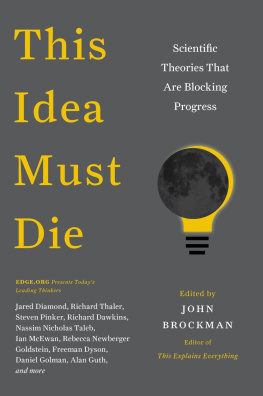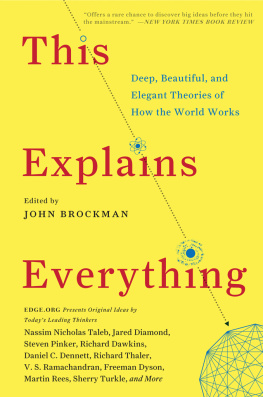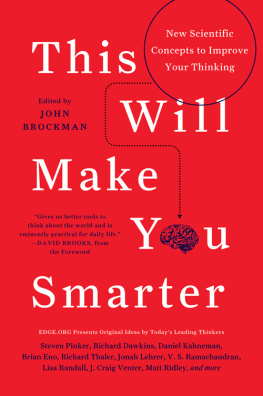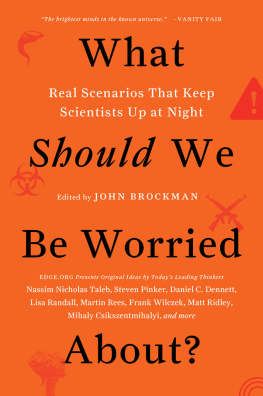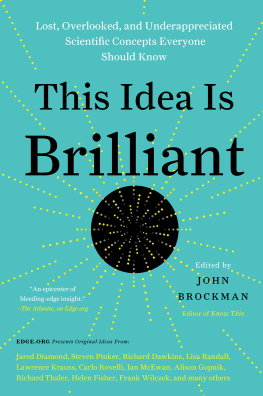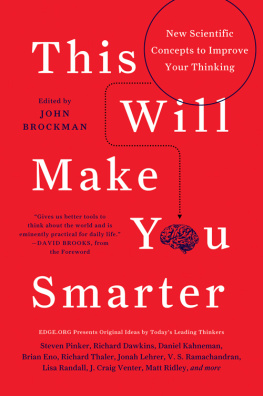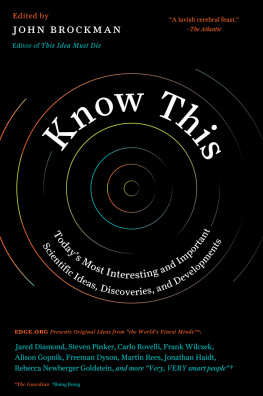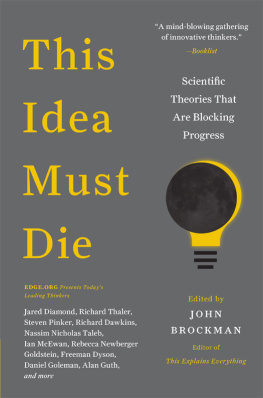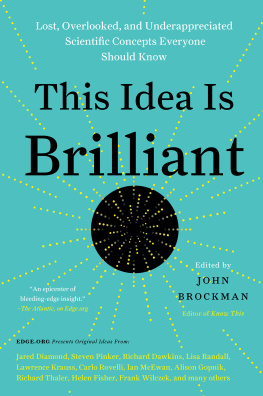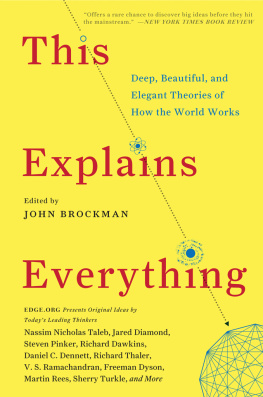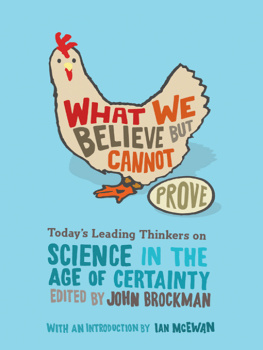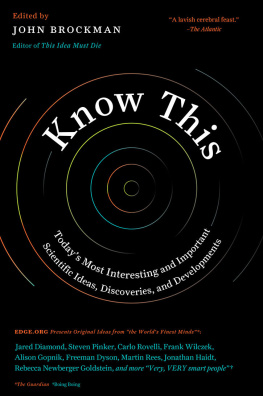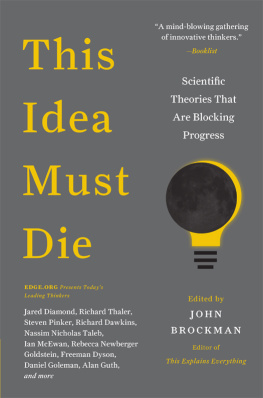
To Richard Dawkins, Daniel C. Dennnet, Jared Diamond, and Steven Pinker
Pioneers of the Third Culture
CONTENTS
GEOFFREY WEST
MARCELO GLEISER
A. C. GRAYLING
SETH LLOYD
SCOTT ATRAN
LEO M. CHALUPA
HOWARD GARDNER
VICTORIA WYATT
NIGEL GOLDENFELD
NICHOLAS HUMPHREY
LEE SMOLIN
ALAN GUTH
BRUCE PARKER
ANDREI LINDE
MAX TEGMARK
LAWRENCE M. KRAUSS
PAUL STEINHARDT
ERIC R. WEINSTEIN
FRANK TIPLER
GORDON KANE
PETER WOIT
FREEMAN DYSON
DAVID DEUTSCH
W. DANIEL HILLIS
NINA JABLONSKI
RICHARD DAWKINS
PETER RICHERSON
JULIA CLARKE
KURT GRAY
MICHAEL SHERMER
DOUGLAS RUSHKOFF
ROGER HIGHFIELD
ANTON ZEILINGER
STEVE GIDDINGS
AMANDA GEFTER
HAIM HARARI
SARAH DEMERS
MARIA SPIROPULU
ED REGIS
SEAN CARROLL
NICHOLAS G. CARR
REBECCA NEWBERGER GOLDSTEIN
IAN BOGOST
SAM HARRIS
DANIEL C. DENNETT
SUSAN BLACKMORE
TODD C. SACKTOR
BRUCE HOOD
THOMAS METZINGER
JERRY COYNE
ROBERT PROVINE
JONATHAN GOTTSCHALL
GEORGE DYSON
ALAN ALDA
GAVIN SCHMIDT
MARTIN REES
SEIRIAN SUMNER
KEVIN KELLY
ERIC J. TOPOL
TIMO HANNAY
ROBERT SAPOLSKY
ATHENA VOULOUMANOS
STEVEN PINKER
ALISON GOPNIK
KILEY HAMLIN
OLIVER SCOTT CURRY
SIMON BARON-COHEN
DANIEL L. EVERETT
TOR NRRETRANDERS
JAMIL ZAKI
ADAM WAYTZ
GARY KLEIN
DEAN ORNISH
RICHARD NISBETT
AZRA RAZA
PAUL DAVIES
STEWART BRAND
BENJAMIN K. BERGEN
N. J. ENFIELD
JOHN M C WHORTER
DAN SPERBER
KAI KRAUSE
IAN M C EWAN
GARY MARCUS
CHRISTINE FINN
DIMITAR D. SASSELOV
SHERRY TURKLE
ROGER SCHANK
TANIA LOMBROZO
FRANK WILCZEK
ALEXANDER WISSNER-GROSS
DAVID GELERNTER
TERRENCE J. SEJNOWSKI
PATRICIA S. CHURCHLAND
TOM GRIFFITHS
ROBERT KURZBAN
RODNEY A. BROOKS
SARAH-JAYNE BLAKEMORE
STEPHEN M. KOSSLYN
ANDRIAN KREYE
ERNST PPPEL
ANDY CLARK
LAURIE R. SANTOS & TAMAR GENDLER
JAY ROSEN
ALEX (SANDY) PENTLAND
MARGARET LEVI
RICHARD H. THALER
SUSAN FISKE
MATT RIDLEY
CESAR HIDALGO
HANS ULRICH OBRIST
LUCA DE BIASE
MICHAEL I. NORTON
GIULIO BOCCALETTI
LAURENCE C. SMITH
DANIEL GOLEMAN
STUART PIMM
BUDDHINI SAMARASINGHE
SCOTT SAMPSON
EDWARD SLINGERLAND
ALEX HOLCOMBE
ADAM ALTER
BRIAN CHRISTIAN
KATHRYN CLANCY
AUBREY DE GREY
ROSS ANDERSON
KATE MILLS
MELANIE SWAN
FIERY CUSHMAN
SAMUEL ARBESMAN
JUNE GRUBER
ELDAR SHAFIR
DAVID BERREBY
DAVID M. BUSS
HELEN FISHER
BRIAN KNUTSON
PAUL BLOOM
PASCAL BOYER
LAURA BETZIG
JOHN TOOBY
STEPHEN STICH
ALUN ANDERSON
MARTIN NOWAK
MICHAEL McCULLOUGH
KATE JEFFERY
IRENE PEPPERBERG
STEVE FULLER
SATYAJIT DAS
DONALD D. HOFFMAN
GREGORY BENFORD
CARLO ROVELLI
ANDREW LIH
NEIL GERSHENFELD
SAMUEL BARONDES
HUGO MERCIER
JARED DIAMOND
MIHALY CSIKSZENTMIHALYI
MARY CATHERINE BATESON
JONATHAN HAIDT
GERALD SMALLBERG
LISA BARRETT
ABIGAIL MARSH
DAVID G. MYERS
JOEL GOLD & IAN GOLD
BEATRICE GOLOMB
EDUARDO SALCEDO-ALBARN
CHARLES SEIFE
GERD GIGERENZER
EMANUEL DERMAN
VICTORIA STODDEN
NICHOLAS A. CHRISTAKIS
NASSIM NICHOLAS TALEB
BART KOSKO
RICHARD SAUL WURMAN
PAUL SAFFO
My thanks to Laurie Santos for suggesting this years Edge Question and to Paul Bloom and Jonathan Haidt for their refinements. As always, thanks to Stewart Brand, Kevin Kelly, George Dyson, and Steven Pinker, for their continued support. I also wish to thank Peter Hubbard of HarperCollins for his encouragement. I am also indebted to my agent, Max Brockman, who saw the potential for this book, and, as always, to Sara Lippincott for her thoughtful and meticulous editing.
JOHN BROCKMAN
Publisher & Editor , Edge
Science advances by discovering new things and developing new ideas. Few truly new ideas are developed without abandoning old ones first. As theoretical physicist Max Planck (1858-1947) noted, A new scientific truth does not triumph by convincing its opponents and making them see the light, but rather because its opponents eventually die, and a new generation grows up that is familiar with it. In other words, science advances by a series of funerals. Why wait that long?
WHAT SCIENTIFIC IDEA IS READY FOR RETIREMENT?
Ideas change, and the times we live in change. Perhaps the biggest change today is the rate of change. What established scientific idea is ready to be moved aside so that science can advance?
GEOFFREY WEST
Theoretical physicist; Distinguished Professor and past president, Santa Fe Institute
Everything? Well, wait a minute. Questioning a Theory of Everything may be beating a dead horse, since Im certainly not the first to be bothered by its implicit hyperbole, but lets face it, referring to ones field of study as the Theory of Everything smacks of arrogance and navet. Although its been around for only a relatively short period and may already be dying a natural death, the phrase (though certainly not the endeavor) should be retired from serious scientific literature and discourse.
Let me elaborate. The search for grand syntheses, for commonalities, regularities, ideas, and concepts transcending the narrow confines of specific problems or disciplines is one of the great inspirational drivers of science and scientists. Arguably, it is also a defining characteristic of Homo sapiens sapiens . Perhaps the binomial form of sapiens is some distorted poetic recognition of this. Like the invention of gods and God, the concept of a Theory of Everything connotes the grandest vision of all, the inspiration of all inspirations: namely, that we can encapsulate and understand the entirety of the universe in a small set of preceptsin this case, a concise set of mathematical equations. Like the concept of God, however, its potentially misleading and intellectually dangerous.
Among the classic grand syntheses in science are Newtons laws, which taught us that heavenly laws were no different than the earthly; Maxwells unification of electricity and magnetism, which brought the ephemeral aether into our lives; Darwins theory of natural selection, which reminded us that were just animals and plants after all; and the laws of thermodynamics, which suggest we cant go on forever. Each of these has had profound consequencesnot only in changing the way we think about the world but also in laying the foundations for technological advancements that have led to the standard of living many of us are privileged to enjoy. Nevertheless, theyre all, to varying degrees, incomplete. Indeed, understanding the boundaries of their applicability and the limits to their predictive power, and the ongoing search for exceptions, violations, and failures, have provoked even deeper questions and challenges, stimulating the continued progress of science and the unfolding of new ideas, techniques, and concepts.
One of the great scientific challenges is the search for a Grand Unified Theory of the elementary particles and their interactions, including its extension to understanding the cosmos and even the origin of spacetime itself. Such a theory would be based on a parsimonious set of underlying mathematizable universal principles that integrate and explain all the fundamental forces of nature, from gravity and electromagnetism to the weak and strong nuclear forces, incorporating Newtons laws, quantum mechanics, and general relativity. Fundamental quantities like the speed of light, the dimensionality of spacetime, and the masses of the elementary particles would all be predicted, and the equations governing the origin and evolution of the universe through to the formation of galaxies and beyond would be derivedand so on. This constitutes the Theory of Everything. Its a truly remarkable and enormously ambitious quest, which has occupied thousands of researchers for over fifty years at a cost of billions of dollars. Measured by almost any metric, this quest, which is still far from its ultimate goal, has been enormously successful, leading, for example, to the discovery of quarks and the Higgs boson, to black holes and the Big Bang, to quantum chromodynamics and string theory... and to many Nobel Prizes.
Next page
